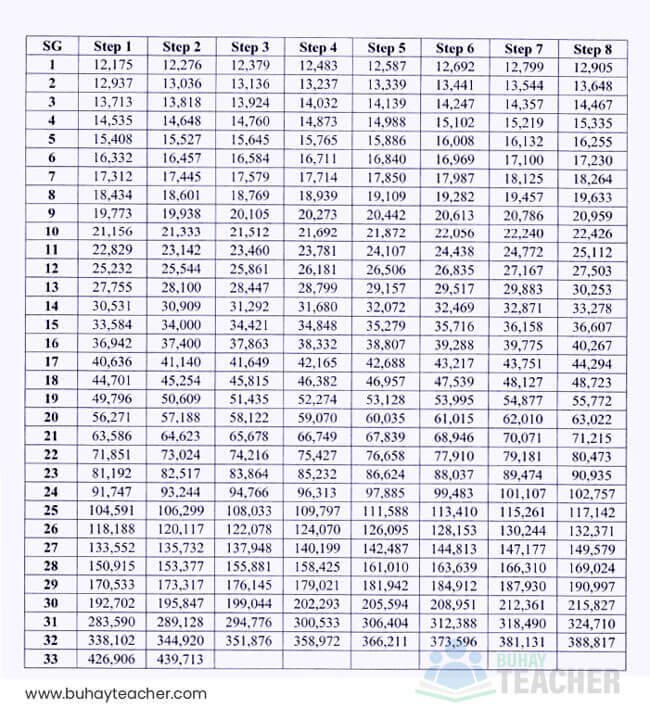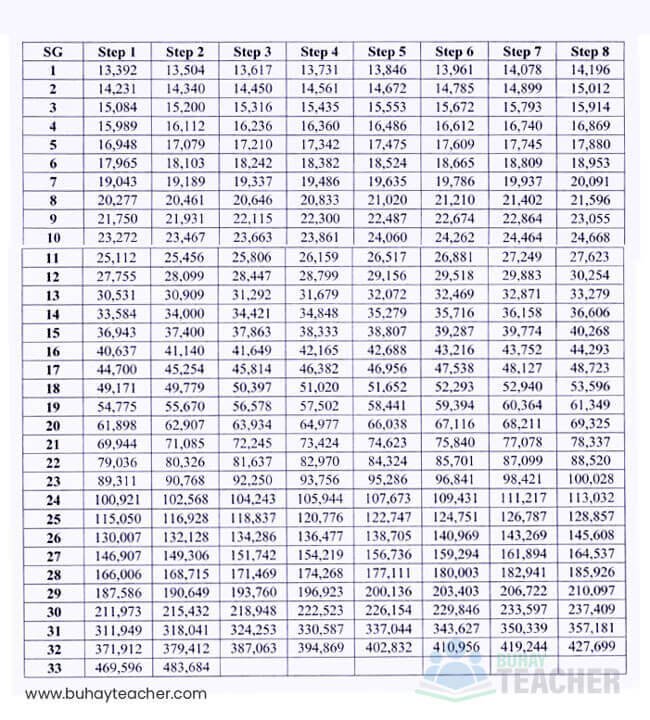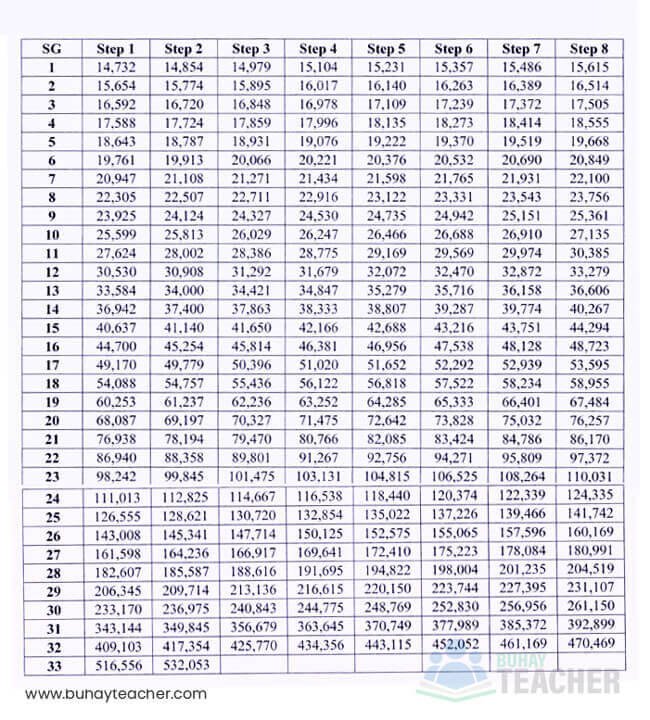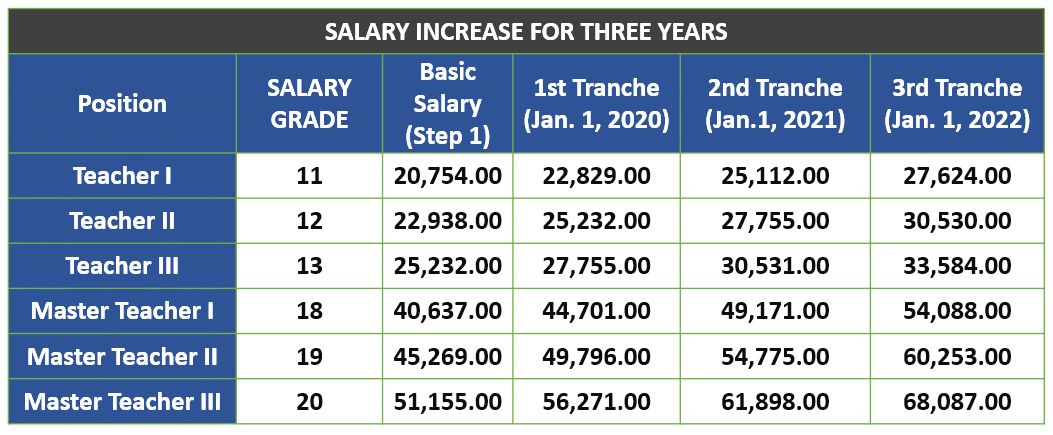SENATE BILL 49: SALARY STANDARDIZATION LAW V
Senator Ralph Recto has filed Senate Bill 49 also known as Salary Standardization Law V that aims to increase the salary of government workers in the country.
AN ACT ADJUSTING THE SALARY SCHEDULE OF CIVILIAN PERSONNEL IN THE GOVERNMENT, AND FOR OTHER PURPOSES
This bill seeks to improve the purchasing power of approximately 1.42 million civil servants in the country that was eroded by inflation by providing an increase in the salary of government officials and employees.
It also aims to attract and retain competent and committed civil servants and promote performance-based work among the public sector workers.
By virtue of Executive Order No. 201, the national government implemented the salary adjustments and additional benefits for government employees which was further amended by
Executive Order No. 76 dated March 15, 2019. The modified Salary Schedule was implemented in four tranches from January 1, 2016 to April 1, 2019. However, the adjusted salary is deemed unfair and inadequate by most government personnel especially those under Salary Grades 1 to 16 which comprise about 84 percent of the government workforce.
This proposal will put more money in government employees’ pockets and will increase disposable income, boost consumer spending, and in turn, would stimulate the economy and help generate more revenues.
This bill mandates a three-year salary increase for government officials and employees at 10% of basic salary per year. The first tranche of the salary adjustment shall be implemented on January 1, 2020, and every January 1 thereafter until the final tranche in 2022.
With this bill, the government would alleviate the living conditions of the 1.42 million public servants. Consequently, the much-needed relief that this measure offers will further motivate government personnel and invigorate public service.
With the foregoing considered, the immediate passage of this bill is earnestly sought.
SECTION I. This Act shall be known as the “Salary Standardization Law V”.
SEC. 2. Declaration of Policy.
Pursuant to the constitutional mandate that the State shall provide for the standardization of salary of government officials and employees, including those in government-owned or -controlled corporations with original charters, taking into account the nature of duties and responsibilities pertaining to and the qualifications required for their positions, the State shall:
(a) implement a salary schedule that is generally comparable with those in the private sector doing comparable work and in accordance with the provisions of existing salary and position classification laws, in order to attract, retain and motivate a corps of competent civil servants;
(b) keep the salary for government personnel fair and reasonable in recognition of fiscal realities and maintain personal services cost at a reasonable proportion of over-all expenditures; and
(c) conduct a periodic review of the salary and position classification system taking into account the changes in skills and competency requirements and the possible erosion in the purchasing power due to inflation, and other factors.
SEC. 3. Coverage.
The Salary Schedule herein provided shall apply to all positions for civilian government personnel in the Executive, Legislative and Judicial Branches, including Constitutional Commissions, State Universities and Colleges (SUCs), Government-Owned or Controlled Corporations (GOCCs) not covered by RA No. 10149, Government Financial Institutions (GFIs) and local government units (LGUs), whether regular, casual or contractual in nature, appointive or elective, on full-time or part-time basis, now existing or hereafter created.
SEC. 4. Salary Schedule for Civilian Government Personnel.
The modified Salary Schedule for Civilian Personnel shall be as follows:
STANDARDIZATION LAW V FIRST TRANCHE

STANDARDIZATION LAW V SECOND TRANCHE

STANDARDIZATION LAW V THIRD TRANCHE

SEC. 5. Salary in Local Government Units
The salary or wage adjustments, provided in Sec. 3 hereof shall also be applied to the LGUs in accordance with the applicable provisions of this Act.
SEC. 6. Non-diminution in the Basic Salaries of Incumbent Employees.
In no case shall there be any diminution in the basic salaries of incumbent employees upon the implementation of this Act. For this purpose, they shall receive the new salary rates prescribed herein which in no case shall be less than their existing salary rates.
SEC. 7. Compensation and Position Classification Report.
The DBM shall prepare a Compensation and Position Classification Report for all government entities in the national government; GOCCs and GFIs including exempt entities and the status of implementation thereof. The reports shall be periodically updated and submitted to Congress and the Commission on Audit for public disclosure, monitoring, compliance with established policies and as a basis for future policy decisions.
SEC. 8. Periodic Review of the Compensation and Position Classification System.
The DBM and Civil Service Commission shall jointly review the Compensation and Position Classification System every three (3) years, develop and recommend to the President a competitive compensation and remuneration system which shall attract and retain talent.
SEC. 9. Appropriations.
The funding sources for the amounts necessary to implement the modified Salary Schedule shall be as follows:
(a) For national government entities, the amount necessary for the immediate implementation of this Act shall be included in the General Appropriations Act (GAA);
(b) For GOCCs and GFIs, the amounts shall come from their respective corporate funds in the approved corporate operating budgets. Government corporations which do not have adequate or sufficient funds shall only partially implement the established rates: Provided. That any partial implementation shall be at uniform proportion of the established rates for all positions in each government corporation; and
(c) For LGUs, the amounts shall be charged against their respective local government funds in accordance with the pertinent provisions of this Act and Republic Act No. 7160.
SEC. 10. Implementation Schedule.
The modified Salary Schedule as provided herein shall be implemented in National Government Agencies as follows, subject to appropriations by Congress:
a. Starting January 1, 2020, the first tranche schedule for civilian personnel;
b. By January 1, 2021, the second tranche schedule for civilian personnel; and
c. By January 1, 2022, the third tranche schedule for civilian personnel
For GOCCs, GFIs and LGUs, the implementation period shall be for not more than three (3) years depending on their financial capability, with each tranche starting not earlier than the dates stated above. GOCCs, GFIs, and LGUs which do not have adequate or sufficient funds shall partially implement the modified Salary Schedule and authorized benefits. In case of partial implementation, the same shall be at uniform percentage across all positions for every GOCC, GFI, and LGU.
SEC, 11. Implementing Rules and Guidelines.
The DBM and GCG shall, within sixty (60) days after the approval of this Act, jointly prepare and issue the necessary guidelines to implement the same.
SEC. 12. General Repealing and Amendatory Clause.
All provisions of laws, decrees, executive orders, corporate charters, implementing rules and regulations, circulars, and other issuances prescribing salary grades for government officials and employees which are inconsistent with the provisions of this Act are hereby repealed, amended or modified accordingly.
SEC. 13, Separability Clause.
If any provision of this Act is subsequently declared unconstitutional, the validity of the remaining provisions hereof shall remain in full force and effect.
SEC. 14. Effectivity Clause.
The Act shall take effect fifteen (15) days following its publication in the Official Gazette or in at least two (2) newspapers of general circulation.
Teachers’ Salary Increase Under SSL V
We created a simplified salary schedule for teachers so that we can clearly see how much would be the increase in the different teaching positions. 
Meanwhile, here is another table we created that shows the salary increase on every tranche of the SSL V. An obvious observation is that the higher the teaching position is, the higher the increase it gets over each tranche. As seen in the table below, an entry-level Teacher I gets a total of P6,870 pay hike in the span of three years while a Master Teacher III is assured of P16,932 pay hike after the third tranche of SSL V is implemented.





what is the latest status of SSL V?